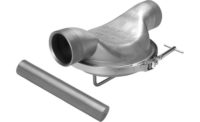Consumers consider a range of attributes in their meat purchasing
While consumers largely seek the mainstays when making their fresh-meat purchases – quality, type, price and flavor – wellness and production practices – health, animal welfare, origin/locally sourced and organic – are becoming increasingly important.
Category Partners (CP) recently surveyed 1,000 consumers, ages 21-65+ – of varying races and household sizes and incomes – across the U.S. Respondents were asked to select their top-five attributes, out of 20, and the above attributes were either the most widely selected or generally trended, percentage wise.
“Aside from quality and price, which always have been important to consumers, a significant number of today’s meat shoppers are more concerned about how their meat was raised, where it originated and its impact on their well-being,” said Cara Ammon, CP’s director of consumer research.
In efforts to drive greater sales – including incremental and impulse – suppliers and retailers can respond to these overall indicators, through targeted sourcing and strong partnerships, need-based assortment, merchandising to highlight these attributes and pricing/promoting for perceived value.
At the same time, meat-purchasing preferences vary based upon a range of demographics, which – depending upon shopper makeup – should certainly be utilized, where possible. More specifically:
Geography
- Midwest consumers are most likely to rank type of meat and sale/promotion as critical and least likely to rank all natural
- Northeast consumers are most likely to name quality/appearance, health, all natural and intended use as top factors and least likely to care about value/price per pound
- Southern consumers are most likely to cite value/price per pound and texture/tenderness as important and least likely to name sale/promotion
- Western consumers are most likely to rank total price per package and cut as most important and least likely to factor type of meat
Age
- Consumers 55+ are most likely to consider quality/appearance as key; those 45+ are more likely to cite type of meat, value/price per pound and cut as important
- Consumers 34 and younger are more likely to name health, all natural, quantity/servings per pound and origin/locally sourced as decisive
Gender
Women are noticeably more concerned than men about:
- Quality/appearance
- Type of meat
- Health
- All natural
- Animal welfare
Men are noticeably more concerned than women about:
- Flavor/taste
- Total price per package
- Quantity/servings per package
- Intended use
- Origin/locally sourced
Race
- Hispanics/Latinos place more importance on all natural and origin/locally sourced
- African Americans are more focused on leanness/fat content and organic
For more information, visit www.categorypartners.com.
Source: Category Partners
Looking for a reprint of this article?
From high-res PDFs to custom plaques, order your copy today!




